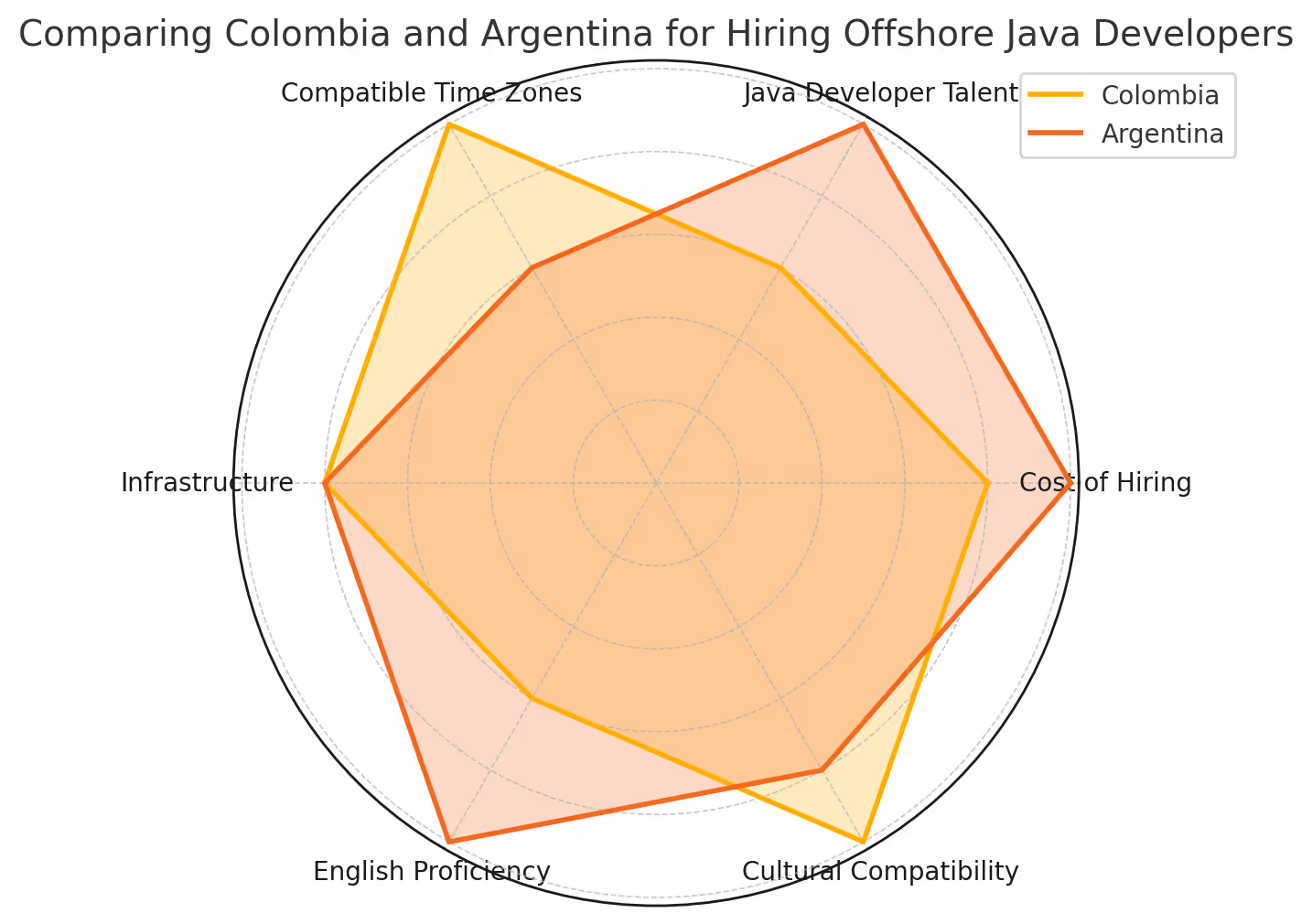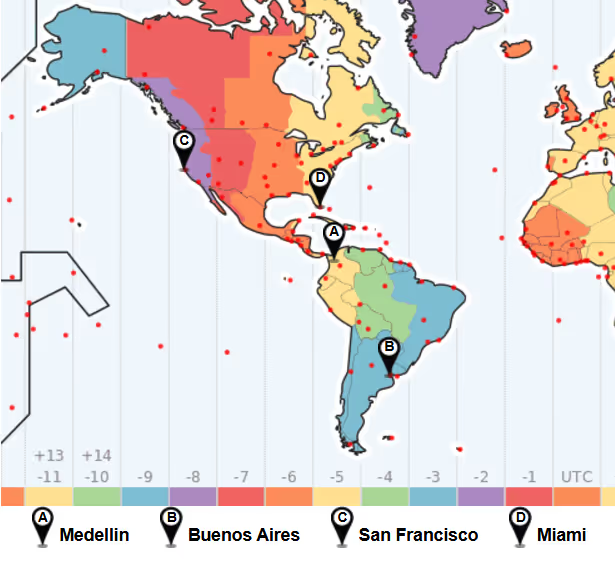If you're responsible for sourcing talent at a technology company in the US or Canada and considering offshore Java developers, Colombia and Argentina are two top destinations worth exploring. Both countries have strong tech ecosystems and offer skilled developers at competitive rates. But how do they compare when it comes to hiring Java developers for your business needs? In this article, we’ll break down the key factors that will help you make an informed decision between Colombia and Argentina.
Hire Offshore Java Developers in Colombia vs Argentina
This chart compares Colombia and Argentina across six key categories to hire offshore Java developers. It highlights each country’s strengths, from developer talent and cost efficiency to time zone compatibility and infrastructure support, helping businesses make an informed decision when choosing between these two Latin American tech hubs.

In the following sections, we will delve into the six key factors that influence the decision to hire offshore Java developers in Colombia and Argentina. These factors include developer talent, cost efficiency, time zone alignment, cultural fit, infrastructure, and developer support, providing a comprehensive comparison to guide your hiring choices.
Cost of Hiring Offshore Java Developers
When considering where to hire offshore Java developers, cost is often one of the first factors to look at. Both Colombia and Argentina offer competitive salaries compared to North America or Europe. However, there are some subtle differences between the two countries.
Colombia: In Colombia, the salary range for a Senior Java Developer typically falls between $3,125 and $7,000 USD per month, depending on the developer's experience and specific location. This makes Colombia an attractive option for companies seeking high-quality developers at a more affordable price compared to Western markets.
Argentina: In Argentina, the salary range for a Senior Java Developer is generally between $3,000 and $6,500 USD per month. Argentina offers competitive rates, particularly considering the level of skill and experience available.
Both Colombia and Argentina offer substantial cost savings, especially for businesses looking to optimize their budgets without compromising on quality.
Java Developer Talent
Both Colombia and Argentina boast strong talent pools when it comes to Java development, but there are some notable differences in terms of skills, education, and industry experience that may influence your decision on where to hire offshore Java developers.
Colombia: In Colombia the talent pool is quickly expanding and improving. Colombia has been gaining attention for its growing tech scene. In 2024, the country hosted several innovation events, such as the Techstars RoadShow, which involved over 1,000 participants, more than 30 investors, 60 mentors, and 200 business ideas across multiple cities, including Medellín and Bogotá.
- 60% of Colombian developers have a background in computer science or engineering, with a significant number having studied at universities like University of the Andes and National University of Colombia.
- More than 50% of Colombian developers have international experience, with many working on projects for U.S. companies.
Colombian developers tend to be very flexible and agile, often excelling in front-end and back-end development for fast-paced projects.
Argentina: In Argentina, Java developers tend to have a high level of expertise, particularly due to the country’s robust educational system and its deep connection to the tech industry. Argentina is home to some of the best universities in Latin America, such as the University of Buenos Aires (UBA) and the National University of La Plata, where many developers receive formal training in software engineering and computer science.
- 85% of Argentine developers have a degree in computer science or related fields.
- Argentina is among the best universities in Latin America.
- Developers in Argentina are often well-versed in best coding practices, system architecture, and the latest Java frameworks such as Spring, Hibernate, and Microservices.
Argentina’s tech community has grown rapidly over the last few years, and the country now ranks as one of the top destinations in Latin America for outsourcing Java development. The combination of solid academic foundations and a high level of industry experience means that Argentina is an ideal choice for projects requiring specialized knowledge in enterprise-level applications and complex software systems.
Learn more about hiring dedicated Java developers in LATAM for your business needs.
Compatible Time Zones
When outsourcing software development, understanding time zones and work hours is essential for smooth communication and collaboration. Working in the same or overlapping time zones can be a significant advantage for real-time communication, quick feedback, and overall efficiency. Here's a look at how Colombia and Argentina compare in terms of time zones and their impact on hiring offshore Java developers.
Colombia: Colombia operates in the GMT -5 time zone, which places it in perfect sync with the Eastern Time Zone (ET) in the United States. This means there is virtually no time difference for teams working in North America (U.S. East Coast and Canada) and those in Colombia. For example: New York (U.S. ET) and Bogotá (Colombia) share the same time zone, so there is no time difference.
This can be a significant advantage for real-time communication, making it easier to schedule meetings, call discussions, and have continuous project updates without having to adjust for a large time gap. The ability to work within overlapping business hours allows for faster feedback loops and greater collaboration efficiency.
Argentina: On the other hand, Argentina follows GMT -3, which is two hours ahead of Colombia. For U.S.-based companies, there is a larger time gap to navigate. New York (U.S. ET) and Buenos Aires (Argentina) are two hours ahead of each other. Los Angeles (U.S. PT) and Buenos Aires have a five-hour time difference.
The Advantages of Working in the Same or Similar Time Zones
- Easier Communication: 92% of employees consider clear communication essential to team productivity, which is made easier when time zones are similar.
- Faster Feedback Loops: Teams with overlapping work schedules can reduce response times on critical projects by up to 30%, increasing overall project speed.
- Collaboration Efficiency: Companies that optimize collaboration through aligned schedules report a 25% increase in real-time problem resolution and a 15% increase in workflow efficiency.

English Proficiency
When you hire offshore Java developers, clear and effective communication is essential, and English proficiency plays a crucial role in ensuring smooth collaboration. Let’s take a closer look at the English proficiency levels in both Colombia and Argentina, as these are significant factors to consider when you hire developers in these countries.
Colombia: Colombia has a moderate level of English proficiency, with the country ranked 74th out of 116 countries in the EF English Proficiency Index (EPI). The average EF EPI score for Colombia is 485, which indicates a moderate proficiency in the English language.
While many Colombian developers, particularly in tech hubs such as Bogotá and Medellín, speak English at a conversational level, their proficiency might not be as high as in other countries, especially for more complex discussions. Developers in Colombia can be a great fit for teams looking for cost-effective talent, but you may occasionally need to adjust communication styles for technical or nuanced discussions.
Argentina: Argentina, on the other hand, stands out in Latin America for its high English proficiency. Ranked 28th globally out of 113 countries, Argentina boasts a EF EPI score of 560, categorizing it in the "High Proficiency" range. The country also ranks 2nd in Latin America for English proficiency.
Argentina has a strong tradition of bilingual education, and developers in major cities such as Buenos Aires, Cordoba, and Rosario generally have a strong command of the English language. Many developers are fluent in English, which can significantly ease communication barriers and streamline project management for international clients.
Cultural Compatibility
Cultural fit plays a vital role in the success of an offshore development project. Both Colombia and Argentina share common traits with Western business practices, making them both attractive options for outsourcing. However, when you hire offshore Java developers, the cultural dynamics in these two countries can differ in subtle yet important ways, influencing communication, collaboration, and overall project success.
Colombia: Colombian culture is known for being friendly, warm, and personal, particularly in professional settings. Relationships are highly valued, and developers often approach work in a team-oriented way. 76% of employees report a strong sense of camaraderie with colleagues, and collaboration is integral to their work culture.
Moreover, Colombia's increasing international presence in the tech industry, with a growing number of tech hubs in cities like Medellín and Bogotá, reflects the country's progressive integration of Western business practices while maintaining its local values of trust and teamwork. If your business values strong interpersonal relationships and a cooperative work culture, Colombia could be an excellent fit for your offshore development team.
Argentina: In contrast, Argentina, with its strong European influence, has a more formal and structured approach to business. The work culture can be more hierarchical, with a clearer distinction between roles and responsibilities. Developers in Argentina are accustomed to a level of independence, often working autonomously or with minimal supervision. Argentine workers appreciate clear boundaries between work and personal life, and they tend to value well-defined processes and roles.
Find out more about hiring remote Java developers in Latin America.
Infrastructure and Developer Support
Both Colombia and Argentina are becoming increasingly attractive options for companies looking to hire offshore Java developers due to their strong infrastructure and supportive ecosystems for tech talent.
Colombia:
Colombia has made significant strides in improving its tech infrastructure, particularly in key cities like Medellín and Bogotá, which are known for their thriving startup ecosystems. In fact, Colombia ranks 13th globally on the Kearney Global Services Location Index, which makes it a prime outsourcing destination.
The country’s internet connectivity has been strengthened with a robust network of fiber optics and data centers, particularly in its growing tech hubs. For example, Bogotá and Medellín are home to numerous coworking spaces that are designed to support remote teams. Colombia’s internet speed ranks well in Latin America, allowing developers to work efficiently on international projects.
Argentina: Argentina also has a solid tech infrastructure, particularly in major cities like Buenos Aires and Córdoba. The Argentine government has implemented various policies and tax incentives aimed at fostering innovation in the tech sector, such as the “Argentina Programa” initiative which provides resources to tech startups. Argentina's IT ecosystem is strong, contributing significantly to the country’s economy, with software exports reaching over $2.4 billion in 2023.
Buenos Aires is home to cutting-edge tech hubs like the IT Hub and the Córdoba Technology Cluster, which provide developers with the resources needed to thrive in a remote work environment.
Find out more about hiring dedicated Java developers in the LATAM for your business needs.
Transparent pricing: Simplifying Offshore Contracting
At Teilur Talent, we believe in complete transparency when it comes to pricing, making it easier for companies to plan and budget their offshore development needs. Unlike other agencies that may have hidden fees or complicated billing structures, we charge a simple flat rate fee of 20% of what the client pays to the developer when they hire offshore Java developers. This means there are no surprises, and you'll always know exactly what you're paying for our services.
This straightforward approach allows you to focus on your project without worrying about unexpected costs or complicated contracts. Whether you're hiring offshore Java developers in Colombia or Argentina, you can count on Teilur Talent to provide exceptional talent at a clear, predictable cost, ensuring a smooth and hassle-free experience for both you and your team.
Learn more about The Importance of Transparency for Developers and Clients.
FAQ
How much does it cost to hire a Java developer?
The cost of hiring a Java developer varies by location, but generally, it ranges from $15,000 to $40,000 USD annually, depending on the country, experience, and the developer's skills.
Where can I hire an offshore Java developer for my business?
You can hire offshore Java developers from agencies like Teilur Talent, which specializes in connecting businesses with top talent from Colombia and Argentina.
Where is the best place to hire a Java developer for your business?
The best places to hire Java developers for your business are countries with strong tech ecosystems, such as Colombia and Argentina, which offer skilled talent at competitive rates and excellent infrastructure for remote collaboration.
Why hire offshore talent?
Hiring offshore talent allows companies to access a larger pool of skilled professionals at competitive rates. It offers the flexibility to scale teams quickly, reduce costs, and tap into expertise that may not be readily available locally.
Conclusion
Colombia and Argentina offer compelling advantages for hiring offshore Java developers, depending on your specific needs. Colombia's proximity to the U.S., favorable time zone overlap, and fast-growing tech ecosystem make it an ideal choice for companies seeking cost-effective solutions with seamless collaboration. Argentina, on the other hand, boasts a highly skilled workforce, strong government support for technology innovation, and excellent infrastructure, making it a great option for more complex projects or those requiring developers with high levels of expertise. Ultimately, the decision between the two will depend on your business priorities, whether it's cost, expertise, or time zone compatibility when you hire developers.
To help you make the best decision, use the calculator below to estimate your costs and potential savings. For more details and personalized advice, please contact us.







